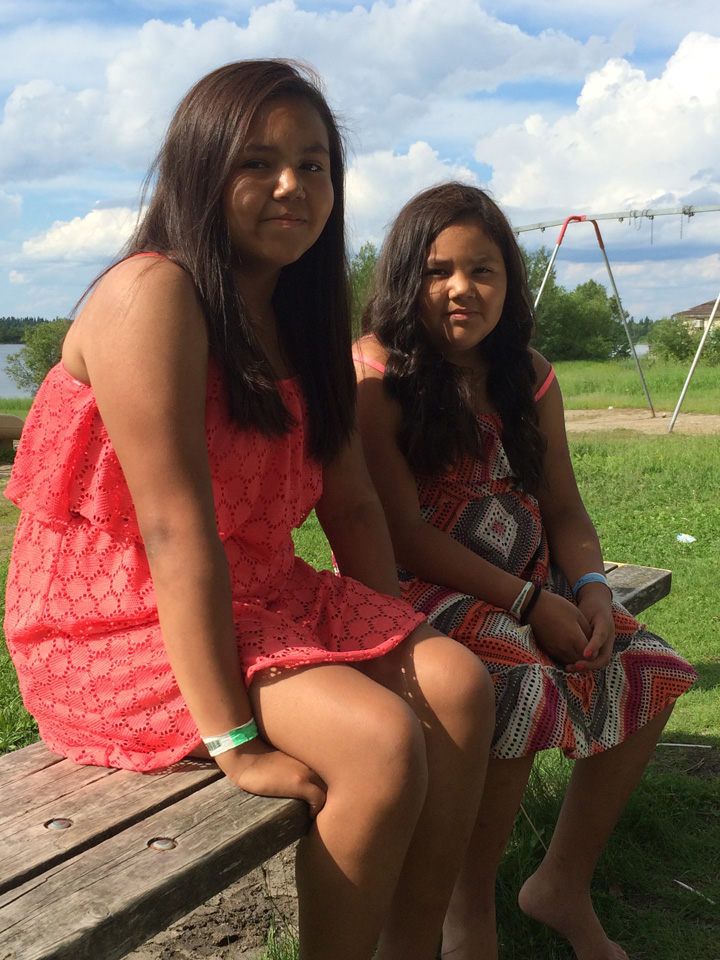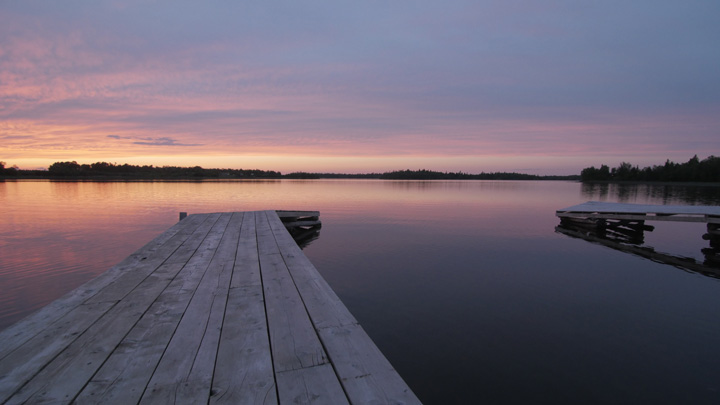Ainsley and Trina Redsky have never turned on a tap in their home and had a glass of water, because it could make them sick. All they know is bottled water.

“It’s kinda hard,” Trina said quietly.
The sisters live on Shoal Lake 40 First Nation, a reserve on the Manitoba-Ontario border. For close to two decades there has been a boil water advisory – one of the longest in Canadian history. With no water treatment plant, large plastic jugs full of safe drinking water are brought in.
Turning on a tap and having a glass of water is now just a memory.
“A lot of children don’t know how nice it must be to drink out of the tap,” grandfather Stewart Redsky said.
READ MORE: How an old recessionary plan may be keeping Canada’s First Nations in ‘third world’ conditions
Since 1982, professor Eva Pip, from the biology department at the University of Winnipeg has been studying water quality in Shoal Lake and the surrounding rivers and bays. She has taken hundreds of measurements and samples of what is in the water at Shoal Lake 40.
“We have seen the tremendous, tremendous change in the quality of the water during that time,” professor Pip told Global News.
The water quality can fluctuate but professor Pip said her tests have shown:
- Cryptosporidium parasites
- Giardia parasites
- Coliform bacteria
- Toxins (when an algal bloom is present)
- Ultra-processed food tied to higher risk of early death, study finds. What to avoid
- N.S. couple felt they won ‘doctor lottery’ after years on wait-list. Now they’re back on it
- Panera to remove ‘Charged Sips’ drink from Canada amid wrongful death lawsuits
- More than half of parents report burnout, U.S. study finds. What can be done?
Health Canada confirms a boil water advisory for Shoal Lake 40. According to the agency, boil water advisories are “recommended when disease-causing bacteria, viruses or parasites are found in the drinking water system.”
Biology professor Eva Pip, from the University of Winnipeg, has studied water quality in Shoal Lake for decades.
Drinking the untreated water can potentially lead to “digestive tract illnesses, things like diarrhea, especially for very young children, vomiting, flu-like illnesses. And this is caused of course by different things depending on what the time of year it is,” Pip said.
According to Pip, toxins are the most serious health risks, they can be produced during an algal bloom, with blue-green algae, “you can actually die from those toxins if they are at a high enough concentration.”
According to Health Canada, “blue-green algae have been known to cause animal and human poisoning in lakes, ponds and dugouts in various parts of the world for over 100 years.” Although the agency said it is unaware of any human deaths in Canada due to blue-green algae.
The U.S. Centers for Disease Control (CDC) states “some algae produce toxins and release them into the water. During a bloom, the amount of toxin present in the water can poison people, wild animals, and pets that go near the water, consume the water, or swim in the water. Cyanobacteria (blue-green algae) blooms and other algal blooms produce toxins that may be harmful to human and animal health.”
READ MORE: Many First Nations communities without access to clean drinking water
The problems for Shoal Lake 40 started when a canal structure was built 100 years ago – isolating Shoal Lake 40 essentially on an island and sending clean water down into an aqueduct bound for Winnipeg’s water treatment plant and diverting dirty water into the reserve, according to chief Erwin Redsky.
“We still live with the consequences” said chief Redsky, “our septic fields are leaking into the water system that actually goes back into the houses.”
In addition, Pip said, to answer the question of who is responsible for the water quality at Shoal Lake and Shoal Lake 40 is confusing — enforcement and monitoring of different activities fall to various governments, including Manitoba, Ontario, the federal government and an international commission. Over the years, according to Pip, the water has been impacted by raw sewage from neighbouring cottages as well as mining, garbage, logging and farming in the larger community.
“It’s very sad, you know, how it’s not just complacency. It’s actual negligence and ignorance,” said Pip.
The City of Winnipeg’s Tim Shanks, manager of water services, vehemently disagrees with Pip’s assessment that “the water quality in Shoal Lake has deteriorated due to mining/development on its shores, and that this is due to “negligence” in protecting the water quality.” Shanks provided Global News a statement that read, “this is completely incorrect. The Shoal Lake Watershed has significant legislative regulation and development agreements that protect water quality. Shoal Lake #40 First Nation limits all harmful development in the local watershed as part of its obligations under the Shoal Lake Tripartite Agreement. Additionally, the multi-government Shoal Lake Watershed Management Plan further regulates development in the larger watershed.”
Global’s 16×9 reached out to Health Canada to find out what is in the water at Shoal Lake 40, the agency confirmed its boil water advisory, and said “for additional details please contact the community directly.”
Shoal Lake 40 is also isolated so getting bottled water to the residents, and travelling to the reserve means dangerous ice roads and an unreliable ferry. To make things right, the chief and community are trying to build an all-weather access road, connecting Shoal Lake 40 direclty to the Trans Canada highway – no more ferry or treacherous ice roads. They are calling it Freedom Road. It would lead to independence and eventually a water treatment plant.
“The greatest threat to life is not water in Shoal Lake 40, the greatest threat to life is just getting home, that you have to cross water at very dangerous times of year,” Cuyler Cotton, spokesman for Shoal Lake 40, told Global News. “There are no alternatives to getting on and off the man-made island,” said Cotton.
So as Shoal Lake 40 continues to fight for its road, the water quality is not improving. “This is such a heart-wrenching situation. And over the years, we’ve made it more and more and more irreparable, said Pip. “And it’s very, very sad because this is, I think, a prime example of all the things that we should not have done.”
With files from Hannah James and Megan Rowney, 16×9
16×9’s “As Long as the Waters Flow” airs Saturday, November 7th at 7pm.







Comments